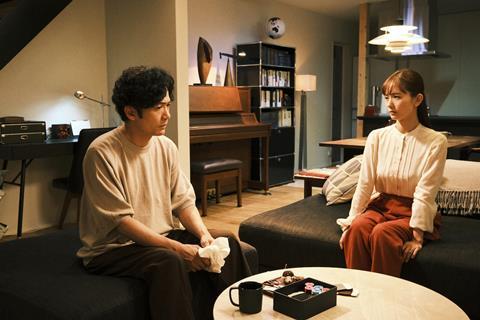A man ponders what to do about his wife’s affair in Rikiya Imaizumi’s languid drama

Dir/scr: Rikiya Imaizumi. Japan. 2022. 143mins.
When Shigemi (Goro Inagaki), a freelance writer and disillusioned novelist, discovers that his wife is cheating on him with another, younger writer (with less talent but more success), what concerns him most is the fact that he doesn’t really care. Meanwhile, he strikes up a platonic friendship with a precociously talented teenage schoolgirl, whose second book has just won a national prize. Rikiya Imaizumi’s languid, talky relationship drama allows itself a great deal of space to explore relationships and the creative process. But the insights the film unearths don’t always feel as if they earn the running time. Still, there are a couple of crisply executed scenes of conflict which inject a crackling energy into this otherwise tentative and pensively observational multi-character study.
Leans very heavily on the screenplay as a driving force
With its themes of literature and infidelity, and an approach which favours long, more or less static mid shots and slightly awkward conversation, this feels a little like a Hong Sang-soo film – minus the excessive soju drinking and the extravagant zooms. But while Hong’s films connect internationally, this picture, and in particular its gently specific humour, is likely to play most successfully to a domestic audience. Following its world premiere at Tokyo (this is Imaizumi’s second feature in the Main Competition, following Just Only Love in 2018), by the window could be of possible interest to further events, particularly those with a specific focus on Asian cinema, and will be released in Japan early in November.
This is an unusually quiet film, both literally – there score is sparingly used and unobtrusive when it does appear – and in terms of the filmmaking. Imaizumi’s directing style is restrained and unshowy; he is content to sit back and let the audience spend extended periods of time eavesdropping on conversations between the characters. Some of these are seemingly banal at first: Shigemi spends a great deal of time discussing the merits of fruit parfait desserts when he meets seventeen-year-old Rua (Tina Tamashiro), a brilliant young writer but also a manipulative and provocative child.
As the film progresses, however, the encounters gather weight. Shigemi confesses, first of all to a stranger and then to his friend Masatsugu (Ryuya Wakaba) – an athlete sidelined by injury who is cheating on his own wife – that he has learned of his wife’s affair and is at a loss about how to proceed. The advice he receives, it becomes clear, is filtered through the personal circumstances of each of his confidantes.
By virtue of the fact that many of the conversations play out in tastefully bland hotel rooms, the backdrop of choice for literary world assignations, this is not a film which projects a particularly strong visual aesthetic. It leans very heavily on the screenplay as a driving force, and as a framework around which the performances are constructed. Unfortunately some of the writing – there are a few too many meandering, looping scenes in which nothing of significance happens – is just not strong enough to carry the rest of the film.
Production company: Lotus Wise Partners Co.,Ltd Japan
International sales: Nikkatsu Corporation Japan international@nikkatsu.co.jp
Producer: Tomotake Hasumi, Yasuhiro Miyoshi
Cinematography: Hidetoshi Shinomiya
Editing: Naoichiro Sagara
Music: Shoji Ikenaga
Main cast: Goro Inagaki, Yuri Nakamura, Tina Tamashiro, Ryuya Wakaba, Mirai Shida, Yoneko Matsukane
























